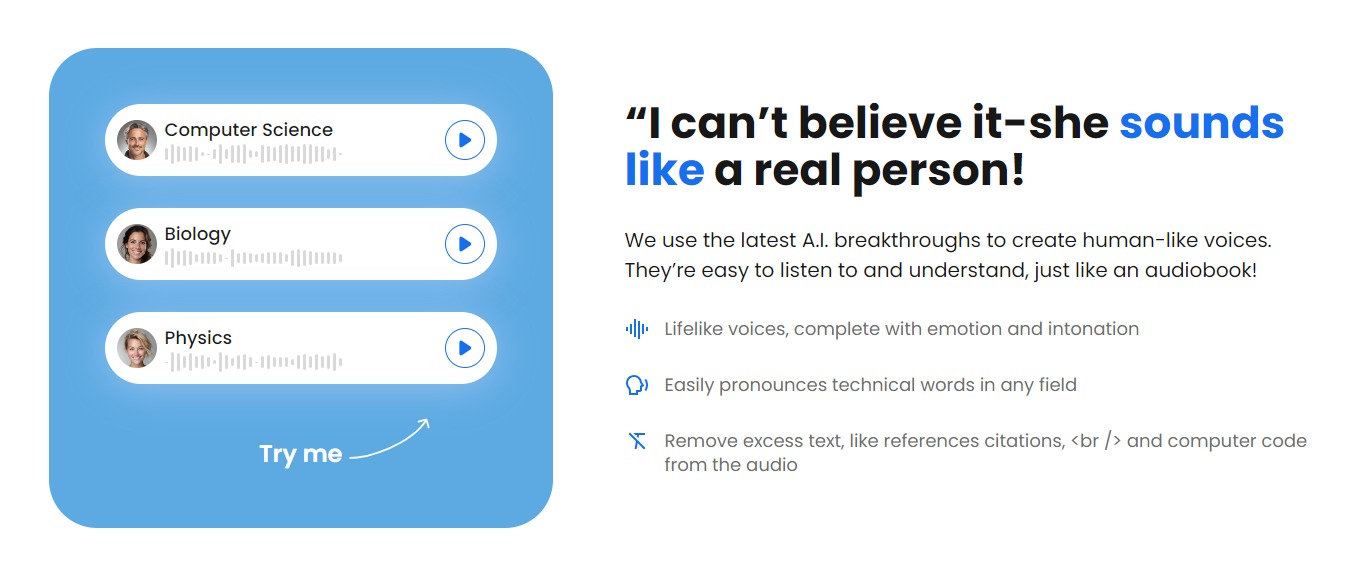Introduction to the 5 Best AI Tools for Teachers
Artificial Intelligence (AI) is transforming various industries, and education is no exception. As AI continues to advance, it offers powerful tools for teachers that can support educators in their daily tasks, personalize learning experiences, and enhance educational outcomes. With many AI tools available, teachers looking to integrate AI in education have a wide range of options to choose from.
In this article, we will explore the top 5 ai tools for teachers in 2024 that can revolutionize the way educators approach learning materials, student engagement, and assessment.

AI Tool #1: Listening.com – The AI Tool for Multitasking Teachers
Listening.com is an innovative AI tool that can help teachers save time and multitask effectively. With its ability to convert academic papers, PDFs, websites, documents, and emails into clear, lifelike audio, Listening.com allows teachers to absorb information on the go. Whether commuting to work, preparing lessons, or grading assignments, educators can listen to important content without being tied to a screen.
One of the key benefits of Listening.com for teachers is its ability to navigate directly to specific sections of a document, such as the abstract, results, or methods. This feature is particularly useful when reviewing educational research or teaching materials, as it allows teachers to focus on the most relevant information without spending hours reading through entire papers.
Listening.com’s advanced AI algorithms also remove excess text, like reference citations and footnotes, from the audio, providing a more streamlined listening experience. The app’s state-of-the-art AI voices effortlessly pronounce technical words across various subjects, ensuring that the content is easy to understand. This tool offers a valuable feature for teachers who need to stay up-to-date with the latest research and teaching methods in their field.
The app’s one-click note-taking functionality is another valuable tool for multitasking teachers. Users can easily capture important ideas, examples, or inspiration while listening to a document, making it simple to incorporate new information into lesson plans or teaching strategies.
By leveraging Listening.com, teachers and students can make the most of their limited time and stay informed about the latest developments in education. The app’s ability to turn written content into engaging audio allows educators to multitask effectively, enhancing their productivity and professional growth.

AI Tool #2: Cognii
Cognii is an AI-powered virtual learning assistant that facilitates personalized tutoring and assessment. With its advanced natural language processing capabilities, Cognii engages students in interactive dialogues, provides instant feedback, and offers guided support. By leveraging Artificial Intelligence (AI), Cognii adapts to each student’s learning pace and style, ensuring a tailored educational experience.
Teachers can utilize Cognii to automate grading of open-ended questions, saving valuable time while maintaining accuracy. The tool’s generative AI algorithms analyze student responses, identify misconceptions, and provide detailed feedback for improvement. This allows teachers to create and to focus on higher-level tasks and provide targeted support where needed.
Numerous educational institutions have successfully implemented Cognii, reporting increased student engagement and improved learning outcomes. For example, a university professor noted a 15% increase in student participation and a 12% improvement in exam scores after integrating Cognii into their online course.

AI Tool #3: Thinkster Math
Thinkster Math is an AI-driven math tutoring platform that combines personalized instruction with real-time feedback. Designed to support teachers in delivering effective math education, Thinkster Math utilizes AI in the classroom to create individualized learning paths for each student. The platform analyzes student performance data, identifies areas of strength and weakness, and dynamically adjusts the curriculum to optimize learning.
One of the standout features of Thinkster Math is its AI-powered grading system. The tool automatically evaluates student work, provides instant feedback, and offers step-by-step guidance for problem-solving. This immediate feedback loop enables students to learn from their mistakes and reinforces their understanding of mathematical concepts.
Case studies highlight the effectiveness of Thinkster Math in improving student outcomes. In one elementary school, the average math proficiency score increased by 25% after implementing the platform. Teachers praised Thinkster Math for its ability to engage students, foster critical thinking skills, and provide targeted support for struggling learners.
AI Tool #4: Knewton Alta
Knewton Alta is a powerful math and statistics-focused adaptive learning platform that leverages AI to personalize instruction. While the platform may have the potential to expand to other subjects in the future, its current focus is on these core areas. With its sophisticated algorithms, Knewton Alta analyzes student performance data, identifies knowledge gaps, and dynamically adjusts the learning experience to suit individual needs.
The platform personalizes the learning path based on a student’s performance, ensuring they receive the most effective instruction for mastery of mathematical and statistical concepts. Knewton Alta doesn’t explicitly claim to adapt to all learning styles, but it personalizes learning based on individual strengths and weaknesses, which can indirectly cater to different learning preferences.
Teachers can use Knewton Alta to gain valuable insights into student progress, identify areas requiring additional support, and make data-driven decisions to enhance teaching strategies. The tool’s comprehensive analytics dashboard provides real-time feedback on student performance, enabling teachers to intervene quickly and provide targeted assistance.
Testimonials from educators highlight the positive impact of Knewton Alta on student learning. A high school science teacher shared how the platform’s adaptive exercises helped students master complex math and statistics concepts more efficiently, leading to a 20% increase in test scores. Another teacher noted how Knewton Alta’s personalized recommendations facilitated differentiated instruction, allowing them to meet the diverse needs of their students effectively.

AI Tool #5: Century Tech
Century Tech is an AI-powered teaching and learning platform that combines personalized instruction with intelligent assessment. The tool utilizes machine learning algorithms to create individualized learning paths for each student, adapting to their strengths and weaknesses. While Century Tech caters to individual needs, extensive adaptation to all learning styles remains an area of ongoing exploration. Century Tech’s AI engine analyzes student interactions, identifies misconceptions, and provides targeted feedback to support mastery of skills and knowledge.
One of the key advantages of Century Tech is its ability to automate administrative tasks, such as lesson planning and progress tracking. The platform’s AI algorithms generate personalized lesson recommendations based on student performance data, saving teachers valuable time and effort. Additionally, Century Tech’s intelligent assessment system automatically grades assignments and provides detailed feedback, enabling teachers to focus on providing meaningful support to students.
Examples of Century Tech’s positive impact on student outcomes are numerous. In a case study involving a network of schools, the implementation of Century Tech resulted in a 30% reduction in the attainment gap between disadvantaged students and their peers. Including details about the subject area, number of schools involved, and the specific assessment methods used in the case study would further strengthen the evidence for Century Tech’s effectiveness.Teachers reported increased student engagement, improved self-directed learning skills, and a more efficient use of classroom time.
The Future of Education: Embracing AI Tools
AI tools have the potential to revolutionize education by empowering teachers to use AI which are powerful resources to personalize learning, automate administrative tasks, and make data-driven decisions. The five AI tools for educators discussed in this article – Listening.com, Cognii, Thinkster Math, Knewton Alta, and Century Tech – represent some of the best options available for educators seeking to integrate AI into their teaching practice.
As AI continues to advance, we can expect even more innovative tools and platforms to emerge, further transforming the educational landscape. Teachers who embrace AI and leverage its capabilities will be well-positioned to enhance student learning outcomes, foster engagement, and prepare students for success in the 21st century.
We encourage teachers to explore these AI tools and consider incorporating them into their classrooms. By harnessing the power of AI, educators or teachers can create more effective, personalized, and inclusive learning environments that support the diverse needs of their students.








